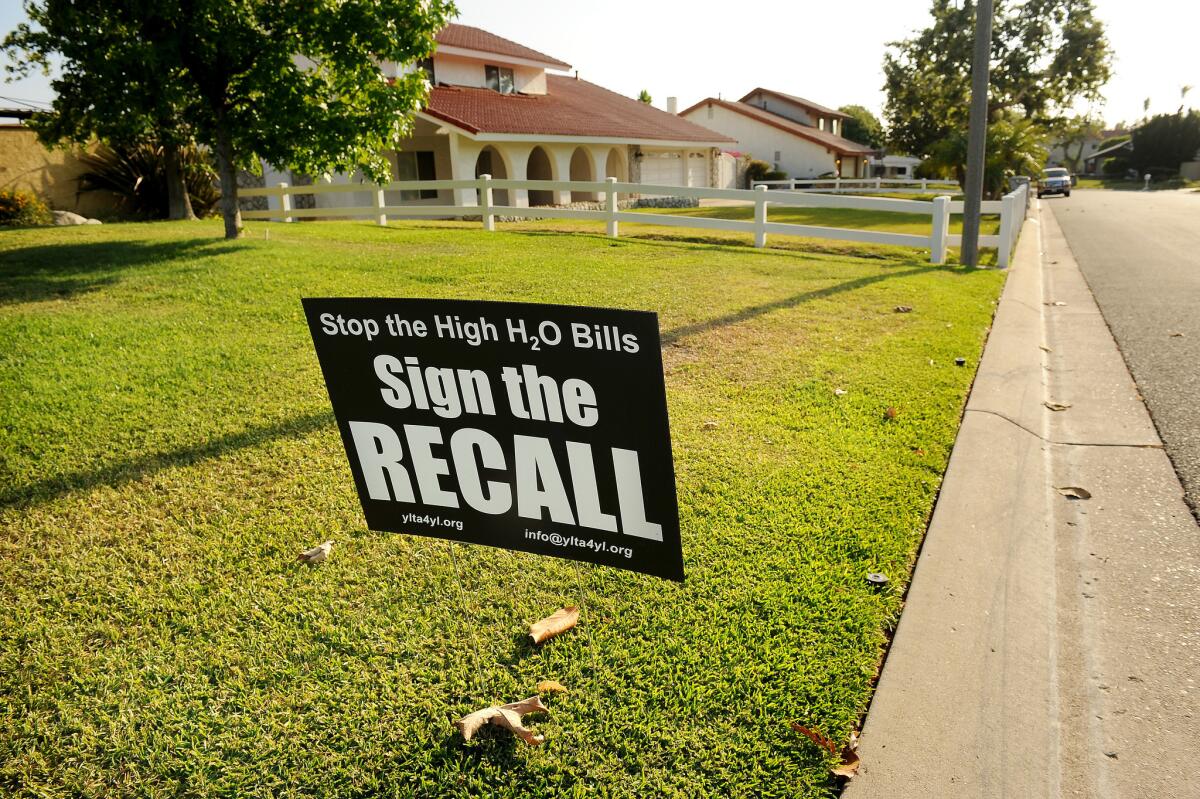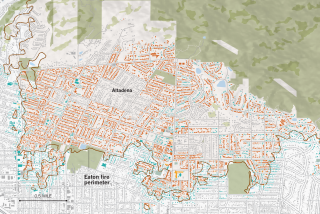Yorba Linda legal fight turns nasty as residents seek to overturn water rate hike

- Share via
With its tract homes, expansive lots and rural soul, Yorba Linda exemplifies the sort of sleepy suburb that would coin the motto “Land of Gracious Living.”
Recently, though, this upscale Orange County city of 66,000 has been anything but.
Longtime residents are engaged in a legal brawl with their water provider, punctuated by vitriol and name-calling that some say reminds them of the 2016 presidential campaign.
At issue is a $25-per-month rate hike that Yorba Linda Water District officials say was needed to keep the agency solvent after state-mandated water conservation blew a hole in its budget.
A group of residents said the sudden spike was much higher than necessary and collected enough signatures to put a referendum on the water rates before voters. The water district refused to back down and declared the referendum improper under the law. The residents sued.
An Orange County Superior Court judge is expected to rule in June on whether customers can void a rate increase using this type of ballot measure. If these Yorba Linda residents get their way, the referendum will provide them with a new tool they can use to challenge rates more easily than under existing law.
But the decision potentially carries far wider implications. If the Yorba Linda residents win, the case would embolden other customers across California to use a referendum ¿¿¿¿¿¿any time officials propose a rate hike, legal experts and water watchers say.
“It’s the road to disaster for utilities,” said Rob Hunter, general manager of the Municipal Water District of Orange County. “People would just say, ‘No, we don’t want to pay more money’ … [and] your rates roll back to what they were.”
To the members of the Yorba Linda Taxpayers Assn., that’s the point.
“We are fighting for our constitutional right ... for voters to be able to decide a water-rate increase,” said Ed Rakochy, the association’s community relations director. “This [water district] board believes that they serve themselves but not the customers. They serve us.”
For decades, the water district hummed along, collecting vast sums of money from residents who used lots of water on citrus groves and massive green lawns. That revenue helped cover the district’s operating costs and drive down the flat fee charged for water service paid by all customers -- including those who used comparatively little water.
The public thinks water is free … but no one thinks about the infrastructure you need to get the water. That’s what you’re paying for.
— Sanjay Gaur, vice president of Raftelis Financial Consultants
But heavy consumption became taboo in the fourth year of California’s drought, and when Gov. Jerry Brown ordered hundreds of districts statewide to slash their water use, Yorba Linda’s revenue model was suddenly threatened. State regulators told the district to slash its use by 36% from 2013 levels.
If their customers cut back that much, officials concluded that the district would lose approximately $9 million in fiscal year 2016. To help cover the gap, the district hastily raised the basic service charge from about $16 to $41.
The taxpayer group collected protest letters in an effort to overturn the new water rates through the cumbersome process prescribed by Proposition 218, a 1996 law aimed at ensuring that voters approve all taxes and most charges levied on property owners.
But the group did not get a majority of property owners to formally protest the water rates, as the law requires, so the increases took effect in October.
About a month later, the residents submitted a referendum, which required far fewer signatures to move forward. The referendum petition, which the county registrar later certified, demanded that the district repeal the new rates or put them up to a vote. But the water district rejected the referendum, saying it was not valid under Proposition 218.
By January, residents sued the district, asking a judge to order the water provider to honor the referendum. Two months later the taxpayers association began a campaign to recall two of the water district’s five board members. Two others are up for reelection in the fall.
“People are being taken advantage of,” said Jeff Decker, chairman and co-founder of the taxpayers association. “How much is enough?”
Over the last several months, the fight between the water district and some of its customers has become heated and personal.
The district’s general manager said someone broke into his car and stole his work computer. A spokesman for the district produced a letter sent to his home in which “a group of concerned YLWD customers” threatened to “drop by.” On the taxpayer association’s Facebook page, a few residents called for a boycott of a local restaurant owned by one of the water district’s board members.
“We’ve got an election coming and we can’t wait,” longtime resident Kent Ebinger said at a district board meeting in January. “If somebody has the word ‘incumbent’ next to his name, hell, he might as well have the name of a rapist or a child molester as far as I’m concerned.”
Water district board members have returned fire, accusing the group of attempting to seize political power.
“The land of gracious living is apparently no longer the land of gracious people,” the agency’s attorney said at a public meeting.
In an interview, Marc Marcantonio, the water district’s general manager, invoked his actual wartime experience to describe the level of hostility.
“I’m a big guy. I’ve been in the Army 23 years. ... I’ve endured a lot from the Vietnam era and everything else,” Marcantonio said. “But this has been the most insulting, toxic environment -- I just can’t believe what has transpired.”
Thanks in large part to the drought and Brown’s executive order, the vast majority of California’s urban water suppliers have raised or are raising their water rates, officials say.
As water sales decrease, most water agencies need to do what Yorba Linda did: increase their basic service charge to cover a larger share of their fixed costs, such as system maintenance and personnel. The fixed costs, experts say, make up the majority of a water district’s expenses and must be paid regardless of how much water customers use.
“The public thinks water is free … but no one thinks about the infrastructure you need to get the water. That’s what you’re paying for,” said Sanjay Gaur, vice president of Raftelis Financial Consultants, which performed Yorba Linda’s recent rate study.
As a result, many water district officials are watching the Yorba Linda case and worrying about its potential impacts on their own rate-making ability.
Repealing water rate hikes through a referendum icould cause suppliers to default on debt obligations and go bankrupt, officials say.
Nobody in Yorba Linda wants to hinder the water district’s ability to deliver water, make capital improvements or perform other basic operations, Decker said. That, he added, “would be foolish.”
But officials warn that too much cost cutting could even lead to consequences like those in Flint, Mich., which faces a contaminated-water crisis.
“They got lower water rates,” said Ric Collett, president of Yorba Linda Water District’s board. “Do you want that?”
ALSO
Tired of homelessness? Here are some opportunities to take action
Public space: Shuttle tank delights big crowds during its ride through Los Angeles
Freeway miracle? Dog survives 5 weeks on highway median with a broken leg and no food or water
Times researcher Scott Wilson contributed to this report.
Twitter: @ByMattStevens
More to Read
Sign up for Essential California
The most important California stories and recommendations in your inbox every morning.
You may occasionally receive promotional content from the Los Angeles Times.










